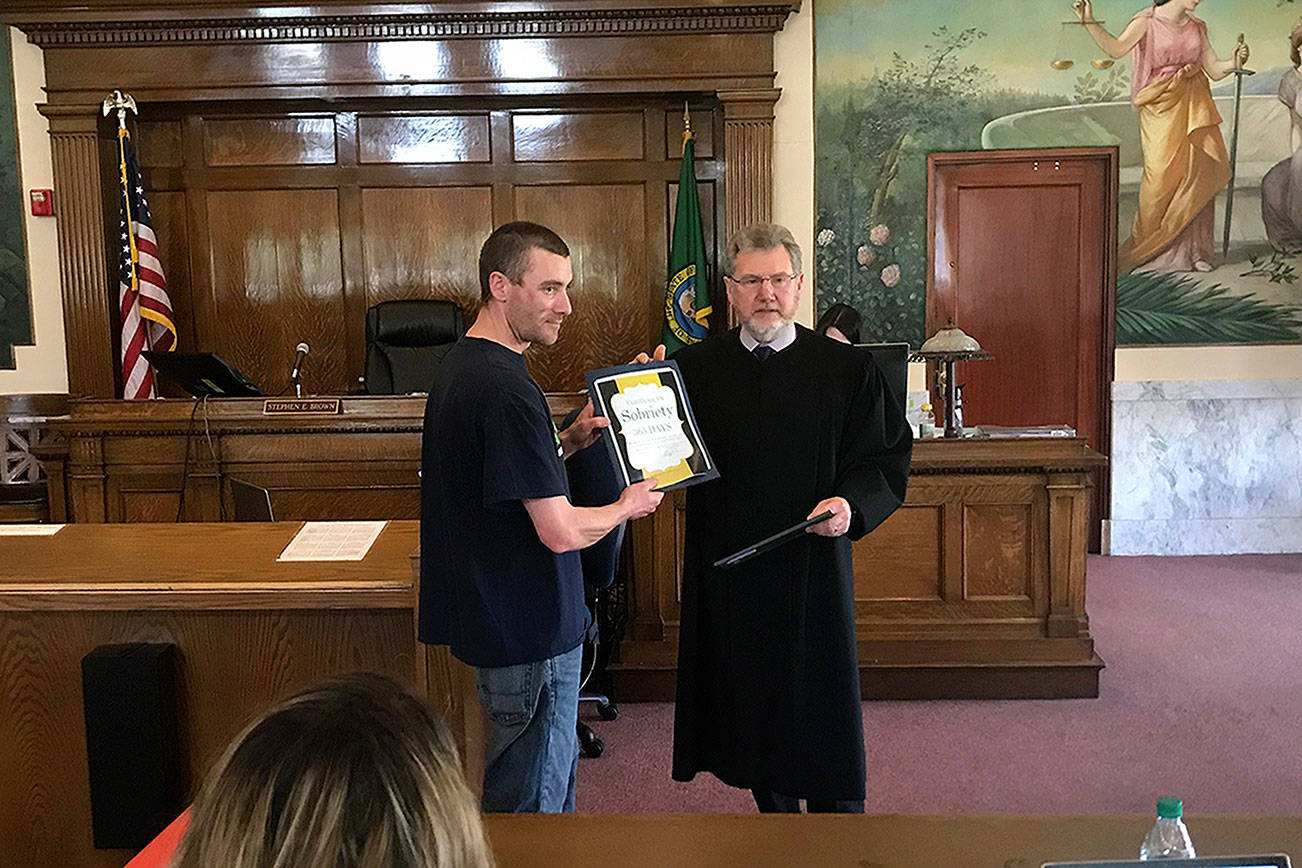When Brice Woods approached the podium at the one-year celebration for Grays Harbor County’s drug court program last Tuesday, it marked an important milestone for him. Woods, who’s been sober more than a year since joining, is close to graduating from the drug-diversion program, and will have his charges of heroin possession and second-degree burglary dismissed if he finishes.
Superior Court Judge Stephen Brown asked Woods what he plans to do after finishing the program, a question that seemed to catch Woods off guard.
“I haven’t really thought about it,” said Woods.
Without the drug court, Woods, 36, said he could have faced up to 14 months in prison, after having only spent several months in county jail previously. Instead, he has a job at a grocery store, a house, and a driver’s license for the first time in his life, he said. He told Brown that the most challenging part of the last year was working to get his son back from Child Protection Services.
Started in April 2018, the drug court, officially called the “therapeutic court,” aims to reduce crime by diverting some individuals who have drug addiction issues from more time in prison, instead giving them treatment and helping them reshape their lives. The individuals facing jail time are recommended through the prosecutor’s office, and they tend to pick the most high risk and high need people who committed non-violent crimes, and are often stuck in the “revolving door of the criminal justice system” for a variety of reasons, according to Brown.
Last Tuesday, the court celebrated its first year of existence, awarding Woods and a few others plaques for completing 365 days of sobriety, and applauding many of the 37 current participants for staying in the program.
The clients range from their early 20s to 50s, and include men and women, who usually have committed crimes such as drug possession, theft or forgery in connection with their addictions. It meets each Tuesday at 2:30 in Superior Court, where Brown reviews each participant’s progress and goes over any issues with violated rules in the contracts they signed, like staying clean and sober and attending required classes for treatment, parenting and more. Usually the court starts with Brown picking one of the clients at random who passed the requirements (referred to as “Allstars”) and gives them a prize like a gift card to a restaurant. For the one-year anniversary, Brown gave out prizes to all of the ones who passed.
Over the roughly 12 to 18 months in the program, clients are required to get a job, find housing, and first of all get sober and stay sober for the entire time. The participants are monitored much more strictly in the beginning months, but slowly gain independence as they check off boxes in the program.
Since it started, three people have dropped out of the program, which Brown said was because they had difficulty staying sober in the first two months, meaning they ended up keeping their original convictions. There are also four who have abandoned the program and are on active warrants. When someone doesn’t comply with the contract or breaks the rules, the program staff try to avoid standard punitive actions, but have sometimes assigned additional work like community service if they fall out of sobriety.
Besides one individual, Brown said all participants who make it past the first couple months of substance abuse treatment have stayed in the program, and he hopes it can continue on for years to come.
Jared Locke, 31, is seven months into the program, and since starting has gotten a job at a manufacturing company. He said that at first he assumed people would take up the program to get out of jail and not complete it, but he said he was surprised to see most of the people taking advantage of the extra chance.
“At first I thought people would use it as an excuse to get out of jail and take off, but so far from what I’ve seen is the majority of people take good advantage of the program,” said Locke.
Brown said he campaigned on the issue of creating a drug court before starting in 2014, and that it was the reason he applied for the Superior Court position.
“I’m really amazed with the progress they’ve made in their lives,” said Brown.
In the future, he hopes to expand it to have other drug courts for other groups like parents whose children are in welfare proceedings, or a mental illness or veteran’s court.
There will be a public info session on the drug court, Tuesday, May 21 from 11:30 a.m. to 1 p.m. at the county commissioners meeting room next door to the Courthouse. Drug court coordinator Jamie Wintrip said multiple stations will be set up to learn about drug court, with statistics from its first year.



